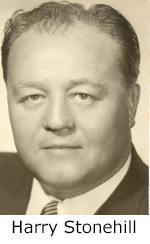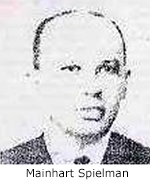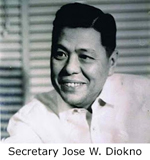 I remember Harry S. Stonehill. In his final months as a powerful and sometimes feared businessman in the Philippines, I would meet with him at his Magsaysay Building office in Ermita where we plotted PR campaigns aimed at curbing the wave of bad press that threatened his very being. Then-Manila-mayor Arsenio H. Lacson complained to me at one time that Stonehill was “crowding me out of the front pages.”
I remember Harry S. Stonehill. In his final months as a powerful and sometimes feared businessman in the Philippines, I would meet with him at his Magsaysay Building office in Ermita where we plotted PR campaigns aimed at curbing the wave of bad press that threatened his very being. Then-Manila-mayor Arsenio H. Lacson complained to me at one time that Stonehill was “crowding me out of the front pages.”
Harry S. Stonehill came to Manila in 1945 as a lieutenant in the US Army. He used his rank and authority to sell four to five dozen US army trucks and a military fuel barge, pocketing about $70K in cash. Harry fell in love with the country and its people, especially noting that he could “get away with murder” being an American and that Filipinos can be “bought.” After his military discharge, Harry returned to the US to persuade his wife to join him and start a new life in the Philippines; she turned him down. With a heavy heart, Harry returned to the Philippines, and, using the $70K he made earlier, started his new life. He divorced his American wife and married a member of a prominent Filipino family.
Harry started his Philippine adventure with partner Ira Blaustein (a discharged US Army sergeant). They organized the Universal Trading Company, a retailer of home appliances (they would purchase the appliances from US Army post exchanges). Later, with partner Robert P. Brooks, he established the US Tobacco Corporation, the firm that manufactured the cheap and very popular “Puppies” brand cigarettes. It was US Tobacco profits that gave Harry the leverage to expand his empire, initially into all areas of the tobacco industry.
By 1962 – seventeen years after he first set foot in Manila – Harry S. Stonehill had a business empire worth $50 million, a terribly huge fortune in those times. But 1962 was also the year Harry S. Stonehill wished he could undo a lot of things he’d done to save his good position in his adopted society and – most especially – his hard-earned fortune.
Stonehill’s empire consisted of about a dozen enterprises that included cigarettes, glass, cement, oil, textile, housing, and the huge and controversial Manila Bay reclamation project. He was the talk of the town. He lived in the exclusive Forbes Park district in Makati. But Harry had a bad side and associated himself with some pretty shady people.
Harry Stonehill was a tough man to work with. While his front office was staffed by the prettiest, most cordial and best-dressed young ladies you could find in Manila, the Stonehill back offices were “knock-down, drag-out” dens where wheeling and dealing took place – and where one could often hear his voice raised in anger, spewing invectives. Harry was pretty mean with his executive staff.
Harry sometimes listened to his staff and their ideas, but he mostly dictated. One of his dictates was the importation of 10 million kilos of high-grade Virginia tobacco. That deal gave him a monopoly of the raw tobacco supply in the country – every other cigarette maker, including top US brands, had to buy tobacco from him. He had all his competition by their “short and curlies” he would brag.
With the tobacco import, Harry also brought into the country Virginia tobacco seeds which he distributed free to farmers in Northern Luzon. He trained Ilocano farmers how to plant, cultivate, reap and cure tobacco leaves – and promised to buy all they produced at very handsome prices. And that was what caused his downfall: it was against federal law to export high-grade Virginia tobacco seeds from the US. The US government subsidized US tobacco farmers. The US tobacco industry wanted Stonehill prosecuted for his “treasonous” act – and the FBI went to work. The FBI wanted Stonehill flushed out of the Philippines.
 Meinhart Spielman – Harry’s manager for the US Tobacco Corporation – started to spill the beans on Harry. Stonehill had earlier fired Spielman for insubordination and for dipping into US Tobacco coffers. Spielman offered to collaborate with the FBI and Philippine government investigators. Spielman was reportedly tricked into trying to leave the country via the island of Sulu in the southern Philippines where he allegedly was to take a boat out of the country but ended up being dumped into the sea. Another account has it that Spielman found his way to Canada where he resided in an assisted-living facility before passing away.
Meinhart Spielman – Harry’s manager for the US Tobacco Corporation – started to spill the beans on Harry. Stonehill had earlier fired Spielman for insubordination and for dipping into US Tobacco coffers. Spielman offered to collaborate with the FBI and Philippine government investigators. Spielman was reportedly tricked into trying to leave the country via the island of Sulu in the southern Philippines where he allegedly was to take a boat out of the country but ended up being dumped into the sea. Another account has it that Spielman found his way to Canada where he resided in an assisted-living facility before passing away.
Because he had bribed almost every Philippine public official – including members of congress and the executive branch – the FBI found Harry Stonehill hard to get, except for one little hole. That little hole was the upright Jose Wright Diokno, the then-Philippine Secretary of Justice.
 Secretary Diokno placed all kinds of pressure and obstacles in Harry’s way, making the American commit more blunders. Members of congress and other government officials whom he had bribed and who were supposedly “under his control” soon started abandoning their benefactor. Harry became the subject of congressional probes. Then-president Diosdado Macapagal distanced himself from Harry. Nothing was more fearful to a Philippine public servant than an FBI operation. The Philippine government charged Harry with bribery, influence peddling and – ironically – economic sabotage.
Secretary Diokno placed all kinds of pressure and obstacles in Harry’s way, making the American commit more blunders. Members of congress and other government officials whom he had bribed and who were supposedly “under his control” soon started abandoning their benefactor. Harry became the subject of congressional probes. Then-president Diosdado Macapagal distanced himself from Harry. Nothing was more fearful to a Philippine public servant than an FBI operation. The Philippine government charged Harry with bribery, influence peddling and – ironically – economic sabotage.
Stonehill and partner Robert Brooks were arrested on multiple charges on March 3, 1962 and ordered deported five months later (on August 3) after the government failed to convict them of anything. Having no other country to settle in, the two finally ended up in the US where they were charged with tax evasion, illegal currency exportation, and economic sabotage, among other crimes. [Read: The US Case versus Harry S. Stonehill and Robert Brooks.]
With his Filipino wife (nee Lourdes Blanco) and four children, Harry wandered from country to country. Every country he visited and stayed in – including Japan, England, Brazil, and Switzerland – would eventually order him expelled. He and his family finally settled in Spain where he died in 2002 at the age of 84.
A sad footnote to Harry’s legacy is that he visited the Philippines in 1987 – he wanted to recover properties that had been taken over by (in his words) “a horde of opportunistic people” that included some of his former executives.
His PR campaign fell flat. That is how I remember Harry.

Pingback: Notes on William Saunders, Ferdinand E. Marcos, and Harry Stonehill: The Name That Binds – Manuel L. Quezon III
Thank for a good read, Im from Makati Manila..the center of all this , I heard as a child in the Philippines..Im a Floridian now…
LikeLiked by 1 person
Thank you, Marco.
LikeLike
Interesting to read about my Grandfather many many years after his death. I hope to live on his legacy here in the U.S. They will regret what they’ve done to my family!!
LikeLiked by 1 person
Indeed, Ryan. Your grandfather was a great person and smart businessman. There is not a time when I would not think of how much he has done for a lot of people who later betrayed him.
LikeLike
Hi, Grandpa, This was a great article on the business man, Stonehill. How sad for him. Hey, also I was reading your profile (pasted below) and found a small typo – in the word “department,” you just need an “r.” Okay, I’ll talk to later – happy Wednesday! Love you, Dad! Uncle Jules
About Julius Willis A former Philippines newspaperman and businessman, Julius resettled in California, USA, where he simultaneously worked as an instructional and technical writer and engineering department manager and taught college for 26 years. Now retired, he serves as a member of the City of Hayward’s Community Services Commission and the Advisory Board of CSU-East Bay’s Center For Filipino Studies. He is also on Hayward’s General Plan Task Force.
From: JULIUS WILLIS: Our World Today To: julius_willis@yahoo.com Sent: Monday, August 17, 2015 9:19 PM Subject: [New post] Harry Stonehill: his enterprise helped him build a business empire, his recklessness and lack of political finesse brought it all down #yiv9049820761 a:hover {color:red;}#yiv9049820761 a {text-decoration:none;color:#0088cc;}#yiv9049820761 a.yiv9049820761primaryactionlink:link, #yiv9049820761 a.yiv9049820761primaryactionlink:visited {background-color:#2585B2;color:#fff;}#yiv9049820761 a.yiv9049820761primaryactionlink:hover, #yiv9049820761 a.yiv9049820761primaryactionlink:active {background-color:#11729E;color:#fff;}#yiv9049820761 WordPress.com | Julius Willis posted: “I remember Harry S. Stonehill. In his final months as a powerful and sometimes feared businessman in the Philippines, I would meet with him at his Magsaysay Building office in Ermita where we plotted PR campaigns aimed at curbing the wave of bad press tha” | |
LikeLike
Thanks, son – sorry I missed the trip to Arid-zone last week. Love you.
LikeLike